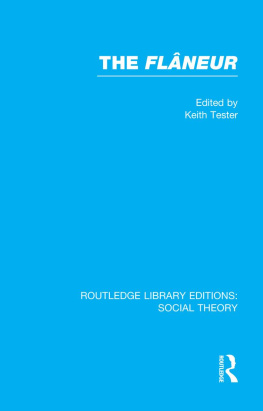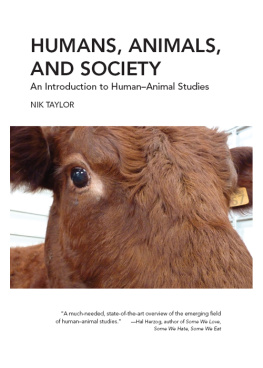ROUTLEDGE LIBRARY EDITIONS: SOCIAL THEORY
Volume 3
ANIMALS AND SOCIETY
ANIMALS AND SOCIETY
The humanity of animal rights
KEITH TESTER
First published in 1991
This edition first published in 2015
by Routledge
2 Park Square, Milton Park, Abingdon, Oxon, OX14 4RN
and by Routledge
711 Third Avenue, New York, NY 10017
Routledge is an imprint of the Taylor & Francis Group, an informa business
1991 Keith Tester
All rights reserved. No part of this book may be reprinted or reproduced or utilised in any form or by any electronic, mechanical, or other means, now known or hereafter invented, including photocopying and recording, or in any information storage or retrieval system, without permission in writing from the publishers.
Trademark notice: Product or corporate names may be trademarks or registered trademarks, and are used only for identification and explanation without intent to infringe.
British Library Cataloguing in Publication Data
A catalogue record for this book is available from the British Library
ISBN: 978-0-415-72731-0 (Set)
eISBN: 978-1-315-76997-4 (Set)
ISBN: 978-1-138-78201-3 (Volume 3)
eISBN: 978-1-315-76386-6 (Volume 3)
Publishers Note
The publisher has gone to great lengths to ensure the quality of this reprint but points out that some imperfections in the original copies may be apparent.
Disclaimer
The publisher has made every effort to trace copyright holders and would welcome correspondence from those they have been unable to trace.
ANIMALS AND SOCIETY
The humanity of animal rights
KEITH TESTER
First published in 1991
by Routledge
11 New Fetter Lane, London EC4P 4EE
Simultaneously published in the USA and Canada
by Routledge
a division of Routledge, Chapman and Hall Inc.
29 West 35th Street, New York, NY 10001
1991 Keith Tester
Typeset by NWL Editorial Services, Langport, Somerset TA10 9DG
Printed and bound in Great Britain by
Mackays of Chatham PLC, Chatham, Kent
All rights reserved. No part of this book may be reprinted or reproduced or utilized in any form or by any electronic, mechanical, or other means, now known or hereafter invented, including photocopying and recording, or in any information storage or retrieval system, without permission in writing from the publishers.
British Library Cataloguing in Publication Data
Tester, Keith
Animals and society: the humanity of animal rights
1. Animals. Treatment by man. Ethical aspects
I. Title
179.3
Library of Congress Cataloging in Publication Data
Tester, Keith, 1960
Animals and society: the humanity of animal rights/Keith Tester.
p. cm.
Includes bibliographical references (p. ) and index.
1. Animal rights History. I. title.
HV4705.T47 1991
179.3 dc20
908763
CIP
ISBN 0415047315
0415047323 (pbk)
CONTENTS
I have inevitably benefited from the advice and support of a number of colleagues and friends whilst I have been working on this project, which began life as a doctoral thesis at the University of Leeds. I am especially grateful to Zygmunt Bauman and Ian Burkitt for their perceptive comments and encouragement. Greater although very different help was constantly given by Linda Rutherford. The book is dedicated to her.
I feel obliged to stress that none of the people who have lent their assistance is at all to blame for the analysis developed here. Neither should it be imagined that any of them would necessarily wish to be associated with what I have said. The responsibility is mine alone.
I am very grateful to Jon Wynne-Tyson, Centaur Press, and the Society for Animal Rights, Inc. for kind permission to quote extensively from Henry S. Salt, Animals Rights Considered in Relation to Social Progress.
Our environment has many unpleasant features. One is dog excrement. Piles and pats of it abound, waiting to slip up the inattentive pedestrian. But what do we do if we see a squatting dog? We either express haughty contempt, turn away, or blame the owner. Would any of us kick or punch the dog? Probably not; instead we are more likely to shout at the person holding the lead. On the one hand we seem to believe that the dog is not entirely responsible for its actions, on the other we feel that it should not be deliberately hurt simply because it is doing what it must. We are not certain what we should do about the dog that fouls our front garden, indeed we are not sure we can rightly do anything. Our treatment of the animal is difficult. Animals present society with ambiguities; with companionship, food, clothing, fun, but also with demands for compassion, abstinence and kindness. They disgust and please us; we can do with them what we will yet pull back with horror from open cruelty. The dog makes claims upon us, although we are not entirely sure what those claims are. But they still profoundly influence our treatment of the animal.
This book is about those claims and how they affect the way individuals relate to, and understand, animals. At its broadest, this book is concerned with the relationship between animals and society, but mostly it is about the special claims which are made for animals rights. This explanation of animal rights will discover many surprising incidents in the attitudes and beliefs of humans. I will emphasise the situation in Britain perhaps England is better and only refer to events in other countries if they support any case or illustrate it particularly vividly. This is not because Britain is more respectful of animal rights than anywhere else (just because we see ourselves as a nation of animal lovers, we should be wary of falling into any national chauvinism), but simply because Britain is the environment I know best. I hope that the story told in this book has some relevance elsewhere. In a sentence, I will explore the social processes and relationships which lie behind the many assertions which are made in Britain for the moral relevance of animals, and show how those relationships influence peoples lives.
Concern for animals has a long history. To give just one example, when he wrote the great radical Romantic poem Queen Mab in about 1812, Shelley bewailed the treatment of animals by which the bull must be degraded into the ox, and the ram into the wether (Shelley 1905: 818). Yet he was only interested in the sufferings of animals because they reflected manhood blighted with unripe disease (Shelley 1905: 770). He was not concerned with the relevance of animals so much as with the decay of humanity. The idea of animal rights is rather different precisely because it does say something tangible about animals and advocates that individuals should think about how they treat them. Animal rights does not seem to be as selfish as Shelleys self-serving pity for a castrated ram. The wish to say something morally irreducible, something real, about animals and then establish that statement as a guide for human behaviour is a relatively recent phenomenon. In Britain the concern with animals rights has been an especially widespread and lively social issue since the middle of the 1970s (although, as we will see, the roots of the idea are to be found in the eighteenth century). The surge of interest can be attributed to the debates stimulated by the book









